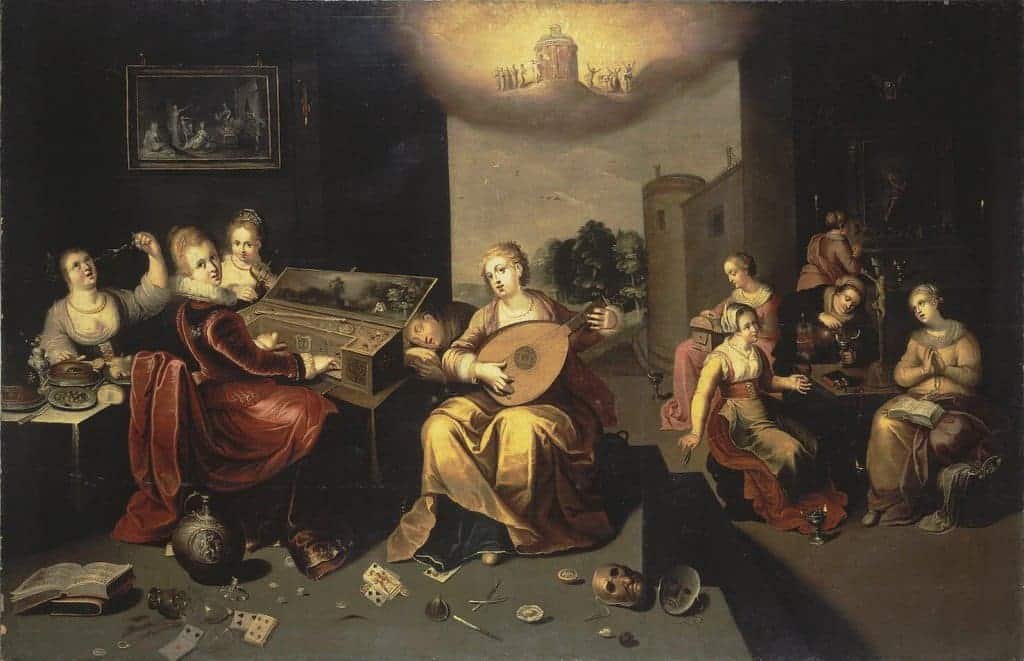How like our God to allow the fate of the world and all humanity to hang on the lips of a teenage girl from Nazareth.
Today is the Feast of the Annunciation, the day when we return to the first chapter of the Gospel of Luke and hear what the angel Gabriel said when he flew in Mary’s window one fine day. “Hail, full of grace.” And we know that Mary was startled. The Gospel says, in an almost-comic understatement, “she was greatly troubled at what was said and pondered what sort of greeting this might be.” But when it came down to the moment of decision, Mary was ready. “May it be done to me according to your word,” she said. And the Word became flesh.
Mary didn’t know that Gabriel was coming. She didn’t know what God had in store. But her heart was open and her mind prepared. She was innocent because she was wise.
The feast of the annunciation has special meaning for women religious. I remember, some years ago, attending a first vows ceremony. It was held in a big church in the Bronx. There were twelve young women present, all taking the veil for the first time in a local congregation that deals with young mothers in trouble.
The deacon read the Gospel. It wasn’t the annunciation but the parable of the five wise and five foolish virgins (Mt 25:1-13). We all know the story of how the five virgins who are prepared for the bridegroom’s arrival are rewarded, while the five who are not prepared are excluded from the feast.
But the priest who preached that day got into trouble. Because there were twelve young women there, all taking their vows. And in the Gospel, there were only five wise virgins.
Relatives in the pews started sizing up the novices, saying to themselves, “Yes, she looks like a wise virgin.” “Well, she’s kind of a mess. Maybe her lamp will go out.” The new sisters themselves got fidgety. It was an awkward coffee hour after Mass.
I suspect Mary, the ultimate wise virgin, would have laughed.
This is what I would have said to those sisters:
Are you a wise virgin? Do you even want to be one? If so, let Mary show you what it means to be wise.
We have plenty of cartoonish notions of how wise virgins are supposed to behave. There is a 17th century painting on this subject by the Dutch artist Hieronymus Francken. On the left we see the five foolish virgins. What are they doing? Playing the fiddle, playing cards, taking a nap, sitting on a wine jug, and gobbling down a big dinner. Then on the right, are the five wise virgins. One is kneeling in prayer with a pained expression, another is contemplating a crucifix, a third is studying a book, and the remaining two are mending clothes and washing dishes.
When you look at that picture, you think, “Well, I’d much rather join the foolish virgins!” And who wouldn’t? Because the image of virtue presented here is not that of the heroic women of Scripture. There are prim Becky Thatchers here, but no Judith, no Ruth, and no Mary. This may be an oil painting by an old Dutch master, but it’s a pretty sad cartoon. This image is false.
Do we celebrate the triumph of the five wise virgins as good little girls who did what they were told? Is that what Mary was, a good girl? The truth is more subtle than that, as any wise old nun will tell you.
Perhaps the wisest old nun I know is Teresa the Great, Saint Teresa of Avila. She knew the truth: the convent, like the whole Church, is a hospital for sinners. And in the convent the wise and foolish virgins dwell together. They dwell together inside each woman. Because in every sister there is a wise and a foolish virgin. It isn’t that the wise virgin prays and washes the pots while the foolish virgin is fiddling or taking a nap. A nun who acts like a wise virgin today may loose her zeal tomorrow and forget why she entered the monastery.
Wisdom is a gift that grows over time and requires cultivation. It is received again and again. Like Mary, you have to say yes to the gift, over and over again. It’s not always easy to say yes. And what is easy in your first year may not be easy in your fortieth. Where do you find the strength?
The wise virgin, as Teresa knew, does not spend her life sucking on lemons, sitting on pins and delectating in drudgery. She does what Teresa did – fall totally in love with the adventure of religious life and give herself to it in joy.
Teresa had boundless energy because she was in love. She didn’t sit on a stool in cramped self-satisfaction. She traveled, she wrote, and she changed the world. She sang with her whole heart, so her biographers say, though she had a hoarse voice. She was in love with the high drama of Christian discipleship. She knew — and we can learn — how to find boundless joy on the road with Jesus.
And in this, Teresa followed Mary. Because, though Mary was entirely free of sin, she didn’t go through life afraid to get her dress dirty. Tradition tells us she was educated. The Gospel tells us she was brave. She was startled by an angel, but she trusted in God. She gave birth in a barn, and almost immediately her Child started doing strange things, but Mary was ready to go. She was strong. She followed her Son down road after dusty road. She followed him right up the hill to the cross. And there, with a roaring crowd around her, she kept her station.
And then Joy returned.
There is joy as well as love and genuine pleasure in the places the Lord shows you. When you find it, take it as God’s gift, just as you take up your religious vocation. Take it and rejoice, because what God is giving you – in the faces of your sisters and the sacraments and the satisfactions of prayer and work – is Himself. He gives himself entirely to you. And he is totally satisfying: as Teresa said, He is enough. With Him you will be happy and brave and really wise.
You might also get a little dusty.
As you say your own fiat, I can say nothing wiser than these words of your older sister Teresa:
Nada te turbe,
nada te espante;
todo se pasa,
Dios no se muda.
La paciencia todo lo alcanza.
Quien a Dios tiene nada la falta:
solo Dios basta.
Let nothing disturb you,
Let nothing frighten you,
All things are passing away:
God never changes.
Patience obtains all things.
Whoever has God lacks nothing;
God alone suffices.





